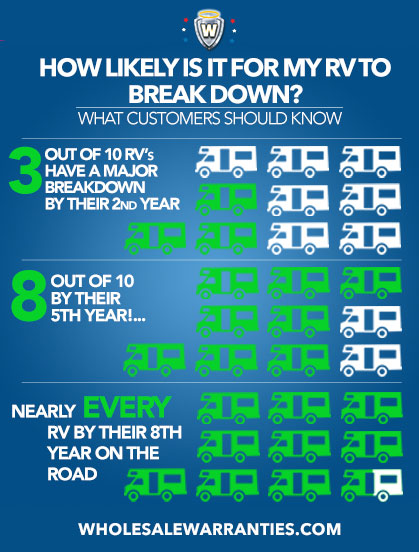Facts You Should Know About RV Warranty Programs
RV Extended Service Contracts, often coined RV warranties, are wholly separate from your RV insurance plan. Insurance covers damages incurred by weather, collisions, or liabilities from accidents, whereas warranties cover the mechanical and electrical components in your rig.
The main purpose of purchasing an RV extended service contract is to protect your budget from the high-cost of mechanical breakdowns.
What exactly does a Warranty Cover?
Within the warranty policy itself, there are different coverage options. These can be personalized depending on how old your rig is, how you use it, and what is most important to you. Typically, you can expect your warranty to cover powertrain and coach components. These can include things like your engine, transmission, appliances, heating and cooling systems, and water systems.
The most extensive coverage can also include repairs to components such as leveling jacks, slide-outs, luxury electronics, and solar panels.
It’s important to have realistic expectations set when it comes to your contract, as warranties won’t cover everything and there are some components that will never be covered. Some of those items include lamps, glass, metal, fabric, and upgrades.
What are the mileage/age restrictions of an RV warranty?
Policies will differ on their restrictions between company to company, but at Wholesale Warranties, we are able to offer policies on motorhomes 15 years old or newer with 100,000 miles or less for full coverage.
Furthermore, our policies allow chassis only coverage for vehicles 20 years old and newer and coach only coverage for vehicles with 125,000 miles or less.
Can I get RV warranty coverage on a used motorhome?
Generally, used rigs are a great way to break into the RV lifestyle on a budget. However, when you’re buying any used home-on-wheels, you are gambling on when the mechanical and electrical components will begin to fail.
Statistics show that 30% of RVs will have a major breakdown by their second year of use. This number increases to 80% in the fifth year and surges to nearly every RV by their 8th year on the road. You can see why a warranty becomes increasingly important as your unit ages and you begin to shell out for pricey repair bills.
So how can you be sure that your used RV will be covered under an extended warranty? There are a few things to look for:
1. Aftermarket Modifications
Aftermarket modifications will be the most important inquiry when purchasing a used unit if a warranty is important to you.
Any modification that affects how the rig operates will make that part, and any related part, void on an RV warranty. For example, if the previous owner modified the engine to get better gas mileage, this would not only render the engine void for coverage, but it would also rid the policy for the other parts affected by this modification. It’s important to note, that aside from modified and affected parts, the coverage would still be active on other components in your unit.
2. Maintenance Records and Usage
How often a unit was used prior to your purchase, along with maintenance records, can provide insight to determine when parts on your rig will fail.
Maintenance records prior to your purchase date aren’t required for the warranty, but they’re a good base to determine what was newly repaired on the unit, and what will need work soon. Using additional tools, such as Carfax, will also give an indication of what damage the rig has incurred prior to purchasing.
Take note of how often the unit was used by its prior owner. It’s standard for a vehicle to drive between 2,500 – 5,000 miles per year. Extremely heavy mileage may put your vehicle outside of the age and mileage restrictions for your prospective policy. In contrast, you don’t want a vehicle that’s been sitting in a garage for years unused. Typically, if an owner has used their rig regularly, they’ve also kept up on maintenance and care.
3. Water Damage
Water damage can wreak havoc on any motorhome, and eventually, can begin to affect the mechanical and electrical components of the unit.
When warranty companies recognize old water damage in a rig, they could potentially deny a claim indicating a preexisting condition.
When scouting your RV, take time to look carefully for any water damage, and consider a third-party inspection for a second look.
At the end of the day, an RV warranty won’t be right for every traveler. Factor in how big your travel budget is, and understand the cost of common repairs if you decide not to purchase coverage. Regardless, familiarize yourself with the facts of RV warranties so you can make an educated decision on whether or not to purchase a policy.
If you are ready to secure peace-of-mind coverage and top of the line customer service, visit Wholesale Warranties to get your free, personalized RV warranty quote.







